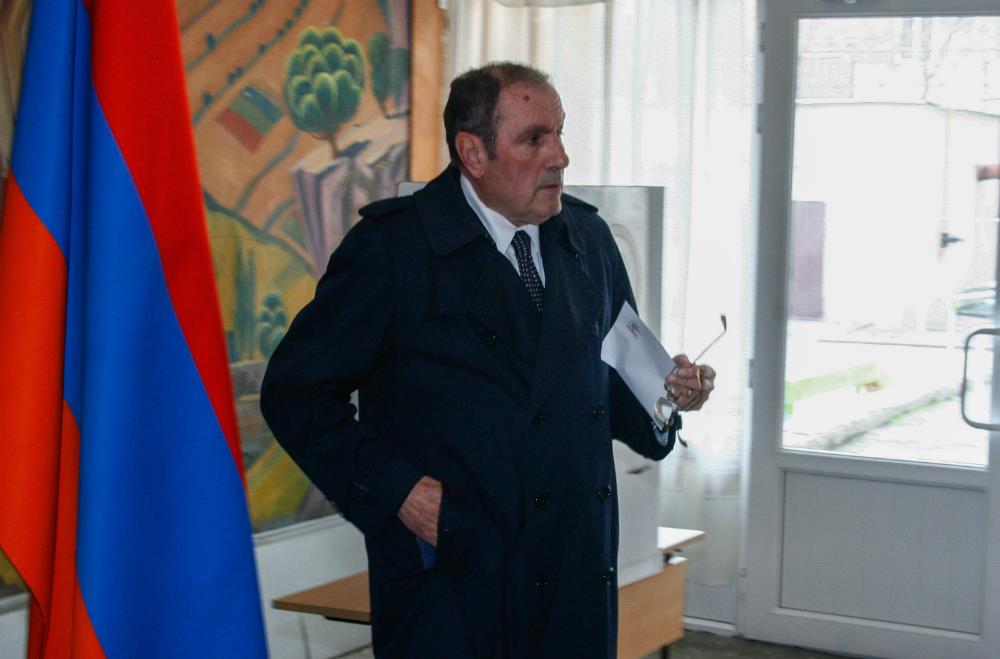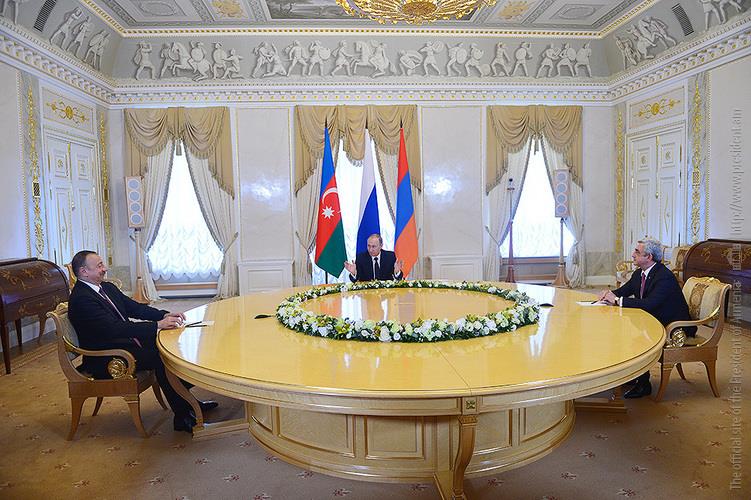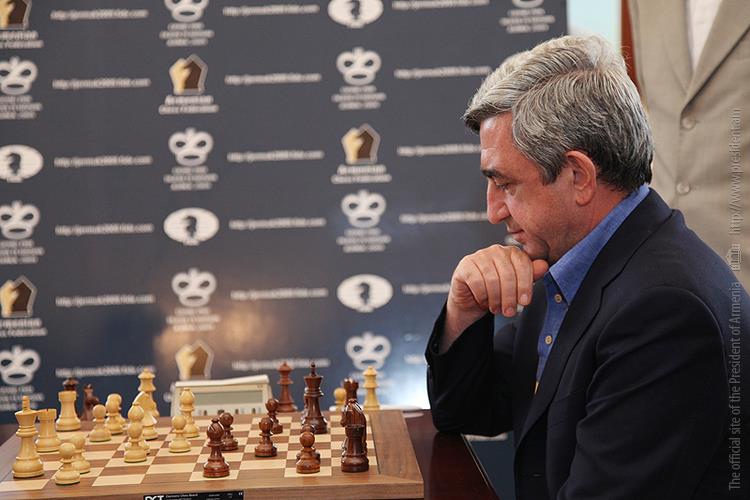‘Putin’s plan’ for Karabakh
Two important factors determine the present-day situation with regard to foreign policy around Armenia and Nagorno-Karabakh. Many people in Yerevan and Stepanakert believe that both of these policies are disadvantageous and even dangerous for the Armenian side.
During his recent visit to the region, Frank-Walter Steinmeier, the Foreign Minister of Germany and OSCE Chairperson-in-Office, stated that “It will be impossible to maintain the status quo in this manner,” and that “the longer the conflict continues, the higher the risk of the hostilities escalating.”
At the same time came reports about the existence of ‘Putin’s plan’, supposedly proposed unofficially to the Armenian side in the lobby during the St. Petersburg meeting. Tatul Hakobyan, a coordinator at the Ani Armenian Research Center, wrote about this. If Hakobayn’s solution is accepted, then it really just resembles the variant offered in 1997 by then-Russian Foreign Minister, Yevgeny Primakov.
It was then suggested that the Nagorno-Karabakh Republic should formally remain under Azerbaijan’s jurisdiction, but that it would in reality be independent from it. Levon Ter-Petrosyan, then-President of Armenia, published a sensational article entitled: “War or Peace? A Time for Reflection, in which he wrote about the possible adoption of that plan. However, his ideas received sharp criticism from his closest allies (including Serzh Sargsyan), and ultimately led to his resignation.
 Levon Ter-Petrosyan, presidential elections, 2013
Levon Ter-Petrosyan, presidential elections, 2013
It seems that something similar is put forth in ‘Putin’s plan’, specifically:
The NKR defense army will be withdrawn from the five districts around Nagorno-Karabakh, according to its 1988 borders;
In exchange for this, Nagorno-Karabakh will be granted ‘solid interim status’ which would not return it to Azerbaijan’s jurisdiction, but neither would it imply that it would gain independence in the foreseeable future;
Armenia and Karabakh will maintain ‘a corridor’, meaning unimpeded land communication;
The referendum on the status of Karabakh status will be postponed for an indefinite period of time.
‘Putin’s plan’ offers NKR security and independence, but the legal aspects of resolving this issue are placed to the wayside. This is a possibility for Azerbaijan, since its constitution does not prevent Karabakh from changing its status in the case it would formally leave Azerbaijan.
President Alyev’s recent statements have indirectly confirmed the possible existence of such a plan:
“Nagorno-Karabakh will never gain independence…As for the status of Nagorno-Karabakh, that is a future matter. It may be given some particular status eventually. Europe and other countries have an ongoing experience, each having different statuses. However, NKR’s status should not violate our country’s territorial integrity.
The ongoing frenzied Russian-Turkish reconciliation and immediate restoration of almost all the elements of bilateral cooperation, whether it be tourism or interaction between their militaries, substantially confirm (although indirectly) the existence of such a plan.
If this plan is implemented, it will be possible to gradually open the Armenian-Azerbaijani and Armenian-Turkish borders. One must recall that the Armenian-Turkish border is controlled by Russian border guards. The Armenian-Turkish reconciliation process may also be resumed.
Opening of the borders in the region and the revival of railway traffic from Azerbaijan to Turkey via Armenia would be beneficial for Moscow, especially given the fact that Russia also controls the Armenian railway. Having maintained control over the railway and the borders, Moscow can dictate new conditions for operation on the regional transport and energy infrastructures. Re-directing regional transit (or a considerable amount of it) from Georgia to Armenia will strengthen Moscow’s economic and political standing in the South Caucasus.
 Putin-Sargsyan-Aliyev, June 2016
Putin-Sargsyan-Aliyev, June 2016
This process may result in Azerbaijan’s gradual reconcialiation of relations with the Euro-Asian Economic Union which Moscow has been long aspiring to join, making no secret of it.
As far as Georgia is concerned, the result will be quite different. The economic problems that Georgia will inevitably have to face due to a drop in transit, are likely to influence the course of Tbilisi’s foreign policy, changing the country’s plans with regard to becoming a part of NATO.
Such processes are advantageous not only for Russia, but for Turkey as well. The country has no direct railway transport with Russia, Azerbaijan and the countries of Central Asia, but there would also occur if the operation of Gyumri border crossing were to resume.
If this plan is implemented, international peacekeeping forces may stand as the guarantors of the new state of affairs. A mandate on this is most likely to be awarded either to the OSCE or the Collective Security Treaty Organization (CSTO), in which Russia leads.
From a theoretical perspective, these are quite logical and possible consequences of ‘Putin’s plan’. Yet, it is absolutely unclear how all this could be put into practice.
“First of all, after the four-day war in early April, there has been visible consolidation in the ‘Armenian world’ (Armenia-NKR-Diaspora). Returning the land, which has been splattered with the blood of Armenian warriors, is now out of question. On the contrary, the de-escalation on the contact line is viewed by many as respite in the face of a new war. Meanwhile, there are no discussions in Yerevan about what the Armenian side can muster against the possible pressure by OSCE Minsk Group member-states and, most importantly, Russia.
 Serzh Sargsyan, President of the Republic of Armenia
Serzh Sargsyan, President of the Republic of Armenia
In addition, it is completely unclear how the Armenian and Karabakh authorities will manage to convince the public to approve the plan, even if authorities show their approval of it. The authorities and public here inhabit different dimensions, and they make no efforts in hiding the fact that there is a profound mistrust between them.
The recent arrest of Zhirayr Sefilian, an important combattant in the first Karabakh war, well-known oppositionist and radical, in Yerevan, quite logically fits into this mold. He was accused of plotting a coup. According to some reports, the houses of other veterans of the Karabakh movement were searched recently as part of the investigation into this case.
As likely as it is unlikely, these may be preventive measures, though it is quite possible that some radically disposed members of the community are really ready to hamper such a resolution of the Karabakh issue, which, in their opinion, is absoliutely unacceptable for the Armenian side.
JAMnews dossier
The escalation of tension in Nagorno-Karabakh in April 2016, resulting in numerous casualties on both sides, made mediators intensify their efforts. Two summits with participation of the Presidents of Azerbaijan and Armenia, Ilkham Alyev and Serzh Sargsyan respectively, were held within the two-month period of May and June. Preparations for the third meeting of this kind are underway now. As it was reported, the meeting is scheduled to be held in Paris in August. There have been speculations that another presidential summit will be held in the USA in autumn.



















